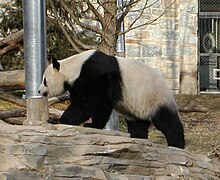pando
Appearance
See also: Pando
English
[edit]Etymology
[edit]Noun
[edit]pando
- (Australia, UK, slang) A pandemic (chiefly in reference to the COVID-19 pandemic).
- [2020 August 20, David Shariatmadari, “Pando, Miss Rona and Covid Toe: how the language of a disease develops – shaped by fear and prejudice”, in Katharine Viner, editor, The Guardian[1], London: Guardian News & Media, →ISSN, →OCLC, archived from the original on 2021-08-28:
- We have crunched Covid-19 to Covid; the specific coronavirus Sars-CoV-2 is mostly now "coronavirus", and has been joined by "the pandemic" (for some in Australia, the "pando"), "'rona" and even "miss Rona".]
- 2021 September 30, u/ThrustersOnFull, “what are some of the professions that are slowly dying ?”, in Reddit[2], r/AskReddit, archived from the original on 2024-02-19:
- Had a radio job before the pando, now I don't. I went to school for it too. Now I gotta change gears and don't know howwwww
- 2023 May 9, u/Magnus_Veritas, “CTA Hoses Train Cars Down With Fresh Piss”, in Reddit[3], r/chicago, archived from the original on 2023-05-09:
- Pre-pando things were really going well. It's such a shame
- 2023 December 4, u/TimothyOilypants, “Out in the wild”, in Reddit[4], archived from the original on 19 February 2024:
- I really hope the next pando is more effective... ¶ I feel like COVID didn't come through on its promise.
Esperanto
[edit]
Etymology
[edit]From French panda, Russian па́нда (pánda).
Pronunciation
[edit]Noun
[edit]pando (accusative singular pandon, plural pandoj, accusative plural pandojn)
Galician
[edit]Etymology
[edit]Pronunciation
[edit]Adjective
[edit]pando (feminine panda, masculine plural pandos, feminine plural pandas)
Derived terms
[edit]References
[edit]- Antón Luís Santamarina Fernández, editor (2006–2013), “pando”, in Dicionario de Dicionarios da lingua galega [Dictionary of Dictionaries of the Galician language] (in Galician), Santiago de Compostela: Instituto da Lingua Galega
- Antón Luís Santamarina Fernández, Ernesto Xosé González Seoane, María Álvarez de la Granja, editors (2003–2018), “pando”, in Tesouro informatizado da lingua galega (in Galician), Santiago de Compostela: Instituto da Lingua Galega
- Rosario Álvarez Blanco, editor (2014–2024), “pando”, in Tesouro do léxico patrimonial galego e portugués (in Galician), Santiago de Compostela: Instituto da Lingua Galega, →ISSN
Latin
[edit]Etymology 1
[edit]From Proto-Italic *patnō, from Proto-Indo-European *peth₂- (“to spread out”). Cognate with pateō, Ancient Greek πέταλον (pétalon, “leaf”).
Pronunciation
[edit]- (Classical Latin) IPA(key): /ˈpan.doː/, [ˈpän̪d̪oː]
- (modern Italianate Ecclesiastical) IPA(key): /ˈpan.do/, [ˈpän̪d̪o]
Verb
[edit]pandō (present infinitive pandere, perfect active pandī, supine passum); third conjugation
- (transitive) to spread or open (out), extend
- (transitive) to unfold or expand
- (transitive) to spread out to dry
- (transitive) to expose, narrate
Conjugation
[edit] Conjugation of pandō (third conjugation)
Derived terms
[edit]Descendants
[edit]- → English: Pando
Etymology 2
[edit]From pandus (“turned”) + -ō (verb-forming suffix).
Verb
[edit]pandō (present infinitive pandāre, perfect active pandāvī, supine pandātum); first conjugation
- (transitive) to bend, curve anything
- (intransitive) to bend (oneself)
Conjugation
[edit] Conjugation of pandō (first conjugation)
Descendants
[edit]- Spanish: pandar, apandar, empandar, pandear, pandeada
- From an unattested Vulgar Latin “in + *pindare”
- Sicilian: mpinnari
Etymology 3
[edit]See the etymology of the corresponding lemma form.
Adjective
[edit]pandō
References
[edit]- “pando1”, in Charlton T. Lewis and Charles Short (1879) A Latin Dictionary, Oxford: Clarendon Press
- “pando2”, in Charlton T. Lewis and Charles Short (1879) A Latin Dictionary, Oxford: Clarendon Press
- “pando”, in Charlton T. Lewis (1891) An Elementary Latin Dictionary, New York: Harper & Brothers
- pando in Gaffiot, Félix (1934) Dictionnaire illustré latin-français, Hachette.
- pando in Enrico Olivetti, editor (2003-2024), Dizionario Latino, Olivetti Media Communication
- Carl Meißner, Henry William Auden (1894) Latin Phrase-Book[5], London: Macmillan and Co.
- to set the sails: vela facere, pandere
- to set the sails: vela facere, pandere
Spanish
[edit]Etymology
[edit]Pronunciation
[edit]Adjective
[edit]pando (feminine panda, masculine plural pandos, feminine plural pandas)
- crooked, bent
- shallow (water)
- sluggish, slow (moving slowly)
- (El Salvador) unlucky (having bad luck)
Derived terms
[edit]Noun
[edit]pando m (plural pandos)
Further reading
[edit]- “pando”, in Diccionario de la lengua española [Dictionary of the Spanish Language] (in Spanish), online version 23.8, Royal Spanish Academy [Spanish: Real Academia Española], 2024 December 10
Categories:
- English clippings
- English terms suffixed with -o
- English lemmas
- English nouns
- English countable nouns
- English nouns with unknown or uncertain plurals
- Australian English
- British English
- English slang
- English terms with quotations
- Esperanto terms borrowed from French
- Esperanto terms derived from French
- Esperanto terms derived from Russian
- Esperanto terms with IPA pronunciation
- Esperanto terms with audio pronunciation
- Rhymes:Esperanto/ando
- Esperanto lemmas
- Esperanto nouns
- Galician terms inherited from Latin
- Galician terms derived from Latin
- Galician terms with IPA pronunciation
- Galician lemmas
- Galician adjectives
- Latin terms derived from Proto-Indo-European
- Latin terms derived from the Proto-Indo-European root *peth₂-
- Latin terms inherited from Proto-Italic
- Latin terms derived from Proto-Italic
- Latin terms inherited from Proto-Indo-European
- Latin 2-syllable words
- Latin terms with IPA pronunciation
- Latin lemmas
- Latin verbs
- Latin transitive verbs
- Latin third conjugation verbs
- Latin third conjugation verbs with suffixless perfect
- Latin terms suffixed with -o (denominative)
- Latin intransitive verbs
- Latin first conjugation verbs
- Latin first conjugation verbs with perfect in -av-
- Latin non-lemma forms
- Latin adjective forms
- Latin words in Meissner and Auden's phrasebook
- Spanish terms derived from Latin
- Spanish 2-syllable words
- Spanish terms with IPA pronunciation
- Rhymes:Spanish/ando
- Rhymes:Spanish/ando/2 syllables
- Spanish lemmas
- Spanish adjectives
- Salvadorian Spanish
- Spanish nouns
- Spanish countable nouns
- Spanish masculine nouns
